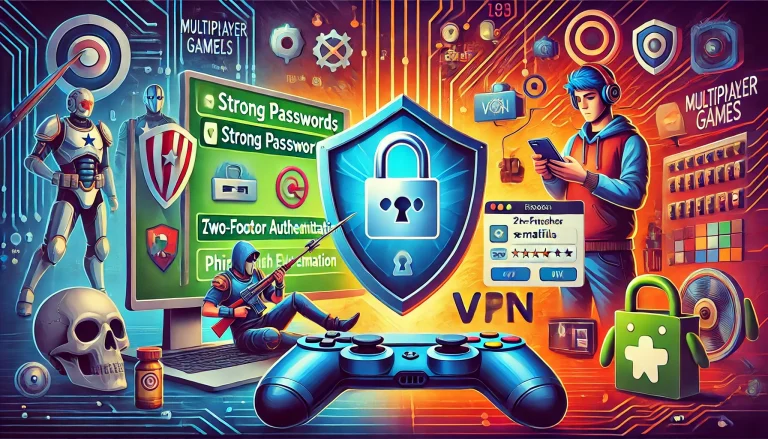Table of Contents
- Introduction
- Why is Security Important in Multiplayer Games?
- Main Security Threats in Online Games
- Phishing
- Scamming
- Malware
- How to Choose a Reliable Game
- Creating a Strong Password
- Tips for Creating Complex Passwords
- Using Password Managers
- Two-Factor Authentication (2FA)
- How to Set Up 2FA
- Benefits of 2FA
- Avoiding Public Wi-Fi Networks
- Regular Software Updates
- Why Updates Are Important
- How to Ensure Your Software is Up to Date
- Privacy Settings in Games
- How to Configure Privacy Settings in Popular Games
- Caution When Downloading Third-Party Software
- Protecting Personal Data on Social Media
- Recognizing Scam Schemes
- How to Identify Fake Offers and Lotteries
- What to Do in Case of a Data Breach
- Steps to Restore Account Security
- Conclusion
- Frequently Asked Questions (FAQs)
Introduction
Online games have become an integral part of our lives. They provide opportunities to relax, compete, and communicate with other players. However, with the growing popularity of online games, the number of security threats also increases. It’s important to know how to protect your data and avoid unpleasant situations. In this article, we will discuss the main threats and provide practical tips for protecting your data in multiplayer games.
Why is Security Important in Multiplayer Games?
Players often underestimate the importance of security in online games. While we enjoy the game, malicious actors can use various methods to steal personal data and gain access to accounts. Protecting your data is not just a matter of privacy but also a matter of the security of your assets and personal information.
Main Security Threats in Online Games
Phishing
Phishing is a method where attackers try to gain access to your data by pretending to be trustworthy sources. They may send fake emails or messages asking for your login and password.
Scamming
Scamming in games includes selling non-existent items, accounts, or services. Be cautious of offers that seem too good to be true.
Malware
Malware can be embedded in infected files or websites. It can steal your data or harm your device.
How to Choose a Reliable Game
When choosing a game, pay attention to the reputation of the developer and user reviews. Avoid downloading games from suspicious websites and ensure the game is regularly updated.
Creating a Strong Password
Tips for Creating Complex Passwords
Use a combination of letters, numbers, and special characters. Avoid using obvious words or dates, such as your birthday.
Using Password Managers
Password managers help create and store complex passwords, significantly simplifying your life.
Two-Factor Authentication (2FA)
How to Set Up 2FA
Many games and services offer two-factor authentication. Follow the instructions on the website or app to set it up.
Benefits of 2FA
Two-factor authentication adds an extra layer of protection, making it significantly harder to hack your account.
Avoiding Public Wi-Fi Networks
Public Wi-Fi networks can be unsafe. Use a VPN to protect your data when connecting to such networks.
Regular Software Updates
Why Updates Are Important
Updates often contain vulnerability fixes. Regularly updating your software helps protect your device from new threats.
How to Ensure Your Software is Up to Date
Enable automatic updates and regularly check for new versions of your software.
Privacy Settings in Games
How to Configure Privacy Settings in Popular Games
Explore the privacy settings in games and configure them to minimize the risk of data leakage.
Caution When Downloading Third-Party Software
Download software only from official websites. Third-party programs can contain malicious code.
Protecting Personal Data on Social Media
Be careful about what you post on social media. Malicious actors can use information from your profile for attacks.
Recognizing Scam Schemes
How to Identify Fake Offers and Lotteries
Be wary of offers that ask for your personal information or account details. If something seems suspicious, it’s best to ignore it.
What to Do in Case of a Data Breach
Steps to Restore Account Security
If you suspect your account has been compromised, change your passwords and contact game support. Regularly check your accounts for suspicious activity.
Conclusion
Protecting your data in multiplayer games is an important and relevant task. By following simple tips and recommendations, you can significantly reduce risks and enjoy the game without fear.
Frequently Asked Questions (FAQs)
1. What is the safest way to store passwords?
Using password managers is the safest way to store and manage passwords.
2. How do I know if my account has been hacked?
Signs of a hack include unexpected changes in settings, unexplained activity, and inability to log into your account.
3. What should I do if I receive a phishing email?
Immediately delete the email and do not click on any links. Report it to the game’s developer or platform.
4. How often should I update my software?
Update your software as soon as new versions become available. Enable automatic updates if possible.
5. Can I trust public Wi-Fi networks?
It’s best to avoid using public Wi-Fi networks for accessing important accounts. Use a VPN to protect your data.
